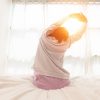
AsianScientist (May. 08, 2025) – The health benefits of a good night’s sleep are numerous. It keeps both body and mind healthy, reduces stress, improves mood, supports heart health and metabolism, and lowers the risk of chronic conditions like type 2 diabetes and high blood pressure. However, as societies become increasingly industrialized and technology becomes an unavoidable part of our lives, we face reduced rest time and growing fatigue.
Insufficient sleep has become a significant public health concern in industrialized societies. Singapore ranks among the most sleep-deprived countries, along with Indonesia, where 51 percent of the population sleeps less than seven hours a day. A study found a high prevalence of insufficient sleep among working adults in Malaysia. This issue affects more than just individuals. Sleep disorders not only increase the risk of chronic diseases but also contribute to traffic accidents, leading to injuries and even fatalities.
One of the key elements to get good sleep is the environment of our bedroom environment. Yet, things like light, sound, and temperature are often overlooked in residential architecture. Light alone plays an important role in sleep, a topic studied in both sleep science and environmental psychology. One of the ways light influences sleep is by regulating our body’s internal clock, primarily through melatonin, the hormone that helps us sleep. Blue light from digital devices such as smartphones and laptops in the evening suppresses melatonin production, making it harder to fall asleep and reducing sleep quality. In contrast, moderate light exposure in the morning can enhance alertness and improve mood.
Most sleep studies use artificial light because it is easy to control. However, researchers at Osaka Metropolitan University believed natural light might be more effective for recreating real-life environments. To test this, the team examined whether introducing moderate natural light into the bedroom just before waking would improve morning wakefulness.
They recruited 19 participants aged 20–30 who regularly slept between 11 p.m. and 1 a.m. and woke between 7 a.m. and 9 a.m., with no known sleep disorders. Participants were also asked to avoid caffeine, alcohol, napping, and intense exercise for three days before and during the experiment.
Using light-blocking curtains and motorized control devices, the researchers conducted a comparative experiment under three conditions: no light before waking (CC), natural light starting 20 minutes before waking (IA), and natural light beginning at dawn (IB). Each participant experienced all three conditions to enable accurate comparisons.
After each session, participants’ sleepiness, alertness, and fatigue were assessed using electrocardiograms, electroencephalograms, and surveys. The results showed that participants were less sleepy under the IA and IB conditions than under the CC condition. Among these, IA was the most effective method for improving wakefulness. Too much light in the IB condition, however, had adverse effects. The findings were published in the journal Building and Environment.
“In the future, we hope to control natural light in the sleep environment as it changes with the seasons and time of day, and to clarify how to introduce natural light that is suitable for a more comfortable awakening,” said Daisuke Matsushita, professor in the Department of Living Environment Design, Graduate School of Human Life and Ecology, Osaka Metropolitan University and one of the authors of the study.
—
Source: Osaka Metropolitan University ; Image: Freepik
You can find the article at Natural light control to improve awakening quality
Disclaimer: This article does not necessarily reflect the views of AsianScientist or its staff.

